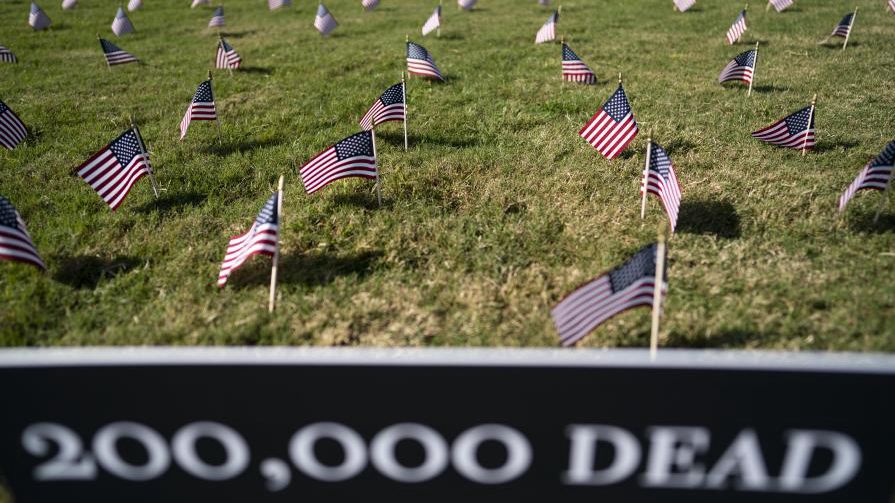


U.S. national flags representing the 200,000 lives lost to COVID-19 in the U.S. are placed on the National Mall in Washington, D.C., September 22, 2020. /Xinhua
In a conversation overheard by an Associated Press reporter, U.S. President Donald Trump was describing how he'd just publicly rebuked one of his top scientists – Dr. Robert Redfield, a virologist and head of the U.S. Centers for Disease Control and Prevention (CDC).
Redfield had angered the president by asserting that a COVID-19 vaccine wouldn't be widely available to the general public until summer or fall of 2021. So hours later, with no supporting evidence, Trump contradicted Redfield, describing his remarks as "confused" and "mistaken." A vaccine, Trump insisted, could be ready before November's election.
The Trump administration's ongoing war against its own scientists continues unabated, even as the nation's COVID-19 death toll has hit 200,000 – nearly half the number of Americans killed in World War II, a once unfathomable number that the nation's top doctors said was avoidable just months ago.
Over the past six months, the Trump administration has prioritized politics over science at key moments, refusing to follow expert advice that might have contained the spread of the virus and COVID-19, the disease it causes.
At times, the White House had tried to sideline or undercut its officials and scientists inclined to talk bluntly about the pandemic, while putting political pressure on health agencies and even interfered with their work, creating confusion and damaging public trust.
"Unfortunately we've seen scientists, public health officials and our government science agencies can be badly undermined," tweeted Tom Inglesby, director of the Center for Health Security at the Johns Hopkins Bloomberg School of Public Health. "We've witnessed scientific recommendations get changed by a political process."
In late January, the CDC launched its emergency operations center. What was needed, epidemiologists said, was an aggressive public education campaign and mobilization of contact tracing to identify and isolate the first cases before the disease spread out of control.
Instead, Trump publicly played down the virus in those crucial first weeks, even though he privately acknowledged the seriousness of the threat.
On Monday, Trump said he had done a phenomenal job on the pandemic that has infected nearly 6.9 million Americans.
"It affects virtually nobody. It's an amazing thing," Trump told supporters at a Swanton, Ohio, campaign rally Monday night. "It affects ... elderly people with heart problems and other problems – if they have other problems that's what it really affects, that's it."
Trump has admitted to playing down the danger of the coronavirus early on because he did not want to "create a panic."
With barely six weeks left before the election on November 3, Trump is behind Democratic rival Joe Biden nationally in every major opinion poll and is neck and neck in key swing states. Trump's handling of the pandemic and subsequent economic downturn has battered his standing among many voters.
The University of Washington's health institute is forecasting coronavirus fatalities reaching 378,000 by the end of 2020, with the daily death toll skyrocketing to 3,000 per day in December.
Dr. Anthony Fauci, the top U.S. infectious diseases expert, said that it was not inevitable that the United States will fall into another dire situation with coronavirus cases surging during cold months. But he is worried about parts of the country where public health measures are not being implemented.

 Award-winning photos show poverty reduction achievements in NE China's Jilin province
Award-winning photos show poverty reduction achievements in NE China's Jilin province People dance to greet advent of New Year in Ameiqituo Town, Guizhou
People dance to greet advent of New Year in Ameiqituo Town, Guizhou Fire brigade in Shanghai holds group wedding
Fire brigade in Shanghai holds group wedding Tourists enjoy ice sculptures in Datan Town, north China
Tourists enjoy ice sculptures in Datan Town, north China Sunset scenery of Dayan Pagoda in Xi'an
Sunset scenery of Dayan Pagoda in Xi'an Tourists have fun at scenic spot in Nanlong Town, NW China
Tourists have fun at scenic spot in Nanlong Town, NW China Harbin attracts tourists by making best use of ice in winter
Harbin attracts tourists by making best use of ice in winter In pics: FIS Alpine Ski Women's World Cup Slalom
In pics: FIS Alpine Ski Women's World Cup Slalom Black-necked cranes rest at reservoir in Lhunzhub County, Lhasa
Black-necked cranes rest at reservoir in Lhunzhub County, Lhasa China's FAST telescope will be available to foreign scientists in April
China's FAST telescope will be available to foreign scientists in April